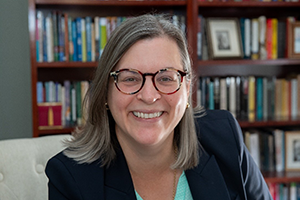In this week's Torah portion, Chayei Sarah, Abraham wishes to find a wife for his son, Isaac, and sends his servant Eliezer to find one among Abraham's kinsmen. Approaching where Abraham's kinsmen dwell, the servant stops and says a prayer:
"Eternal One, God of my master Abraham, please bring me luck today, and do a kindness for my master Abraham.Here I am standing at the water-fount, and the daughters of the townspeople are going forth to draw water; the girl to whom I say, 'Tip your pitcher and let me drink,' and who replies, 'Drink; and let me water your camels, too'-let her be the one You have designated for Your servant Isaac; that is how I shall know that You have done a kindness for my master." (Genesis 24:12-14)
The servant's request is difficult to accomplish. The young woman is to bring water for him and for all 10 of his camels as well. That's a lot of water, a lot more than can be carried at once. The norms of hospitality require that she give a drink to a stranger, so the first part of the test is basic civility. As for watering his camels, he would generally be on his own. Every one of those 10 camels could drink several troughs.
He's seeking out a woman who will go out of her way to go beyond what is required of her and is strong enough to do it. It's a test of both character and strength.
This fits with what we know of the Biblical world. The extent of a person's hospitality is considered a reliable indicator of their character. For example, Abraham was considered righteous because he immediately extends hospitality to the strangers that appear at his encampment and runs to serve them. The people of Sodom and Gomorrah were considered wicked because they wished to inflict harm on strangers in their city. The refrain "be good to the stranger, for you were strangers in Egypt" appears repeatedly in the Exodus narratives. Kindness to strangers is highly valued throughout the Torah.
The servant was looking for a righteous, strong woman who would welcome strangers. And he found her in Rebecca.
Though the Bible does not say that his request (or prayer, or test) was fulfilled by God, the narrative gives us that sense: no sooner had he finished speaking than she appeared. Not only did she fulfill the servant's requirements by offering to give him water and to water his camels, but the text also repeatedly states that she hurried to do so.
Still, we need to be careful here. If we accept that this woman is sent by God to fulfill the servant's prayer, then we also must accept that it is God's will when our prayer does not work out.
Let's look for a moment at a different kind of prayer, at the , the prayer for healing. The phrase "mi shebeirach" means "the One who blesses" - may the One who blesses, who blessed our fathers, Abraham, Isaac, and Jacob, and our mothers, Sarah, Rebecca, Rachel, and Leah, heal this person.
It would be wonderful if we could pray for a miracle and receive one every time we pray. But the Mi Sheberach is not magic. Rather, the Mi Shebeirach is a statement of desired outcomes. It is the expression of a wish to be whole again. The Mi Shebeirach is the acknowledgement of our fear of disease, our desire to hold on to what we love, and our aspiration to have a meaningful life. It is a request that the considerable spiritual energy available to us be focused on the healing of this one person. The prayer is also a request to understand how to respond to illness in our loved ones.
In that sense, the servant's prayer might be read as a request to know how to respond to his specific challenge. Tasked with finding a suitable wife for Isaac, and having experienced Abraham's benevolence in hosting guests, the servant expressed his hope that a woman of gracious hospitality would make herself known to him.
What do you pray for in your own life?
Explore Jewish Life and Get Inspired
Subscribe for Emails

